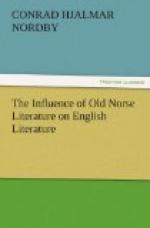RICHARD CLEASBY (1797-1847).
In the forties of the nineteenth century several minds began to work, independently of one another, in this wider field of Icelandic literature. Richard Cleasby (1797-1847), an English merchant’s son with scholarly instincts, began the study of the sagas, but made slight progress because of what he called an “unaccountable and most scandalous blank,” the want of a dictionary. This was in 1840, and for the next seven years he labored to fill up that blank. The record[16] of those years is a wonderful witness to the heroism and spirit of the scholar, and justifies Sir George Dasent’s characterization of Cleasby as “one of the most indefatigable students that ever lived.” The work thus begun was not completed until many years afterward (it is dated 1874), and, by untoward circumstances, very little of it is Richard Cleasby’s. But generous scholarship acknowledged its debt to the man who gave his strength and his wealth to the work, by placing his name on the title-page. No less shall we fail to honor his memory by mentioning his labors here. Although the dictionary was not completed in the decade of its inception, the study that it was designed to promote took hold on a number of men and the results were remarkable for both literature and scholarship.
THOMAS CARLYLE (1795-1881).
First in order of time was the work of Thomas Carlyle. It will not seem strange to the student of English literature to find that this writer came under the influence of the old skalds and sagaman and spoke appreciative words concerning them. His German studies had to take cognizance of the Old Norse treasuries of poetry, and he became a diligent reader of Icelandic literature in what translations he could get at, German and English. The strongest utterance on the subject that he left behind him is in “Lecture I” of the series “On Heroes, Hero-Worship, and the Heroic in History,” dated May, 1840. This is a treatment of Scandinavian mythology, rugged and thorough, like all of this man’s work. Carlyle evinces a scholar’s instinct in more than one place, as, for instance, when he doubts the grandmother etymology of Edda, an etymology repeated until a much later day by scholars of a less sure sense.[17] But this lecture “On Heroes” is also a glorification of the literature with which we are dealing, and in this regard it is worthy of special note here.
In the first place, Carlyle with true critical instinct caught the essence of it; to him it seemed to have “a rude childlike way of recognizing the divineness of Nature, the divineness of Man.” For him Scandinavian mythology was superior in sincerity to the Grecian, though it lacked the grace of the latter. “Sincerity, I think, is better than grace. I feel that these old Northmen were looking into Nature with open eye and soul: most earnest, honest; childlike, and yet manlike; with a great-hearted simplicity




